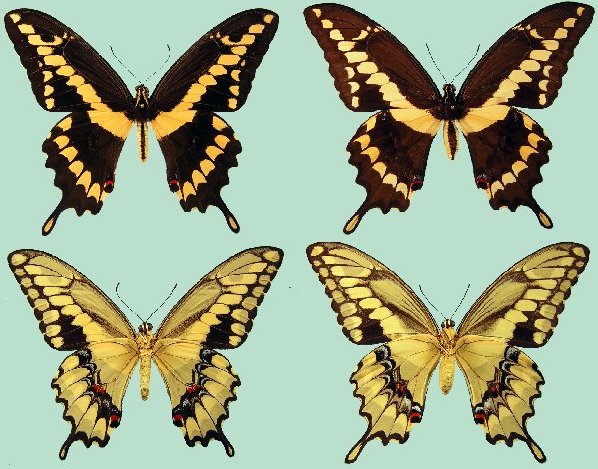Papilio cresphontes

Beginner Rearing Instructions: Giant Swallowtail
Photo Life History: Papilio cresphontes
Habitat: Citrus Orchards; Urban-Suburban as associated with the Lower Sonoran Desert or with prickly ash growing around towns in the midwest, Florida. (Basically, anywhere in the United States where Citrus or prickly ash is established.)
Host Plants: Zanthoxylum americanum, Citrus sinensis, Citrus limon, Citrus aurantium, Ruta graveolens
Suitable Lab Host Plants: Most any species of Citrus will work in the lab. Potted rue is often sold in nurseries and works well.
Caring for Live Female Butterflies: Feed females regularly.
Methods of Female Oviposition: Open Screen Cages
How to Find Eggs: Focus exclusively on host plants with new growth. This can be found either at the tips of branches or suckers coming out of the trunk of the tree.
How to Hatch Eggs: Consolidate eggs into one container
How to Find Caterpillars in the Field: Look for Isolated host plants; Host plants with new growth.
Caterpillar setups: Open terrariums; Open Bucket; Closed Container
Larva to Pupa: Larva purges and wanders
How to Find Pupae in the Field:
Number of Broods per Year: 2-4; depending upon location.
Overwintering Stage: Pupa.
Overwintering Strategies: Your Own Backyard; Refrigerator
Post-Hibernation Strategies: Expose post-diapause pupae to warmer temperatures (room temperature) Long-Day Photoperiod; High Humidity. (Mist spray pupae daily once your bring them out of the cold or refrigerator.)
Avoiding Diapause Techniques: Provide larvae with healthy host plant and expose larvae to long-day conditions.
Disease Prevention: Change out host plant and remove frass every four to six days in an open bucket and every DAY using a closed container.
Emergence: Emergence Container
Field Notes: Larvae are not usually too difficult to find on new growth of Citrus trees in Phoenix and Tucson. Always try to locate new growth to find eggs and caterpillars. Normally, I wouldn't recommend rearing swallowtails in a closed container (with the other exception of P. indra) except, P. cresphontes larvae usually have dry frass and don't get sick if you consistently remove frass and host daily.

